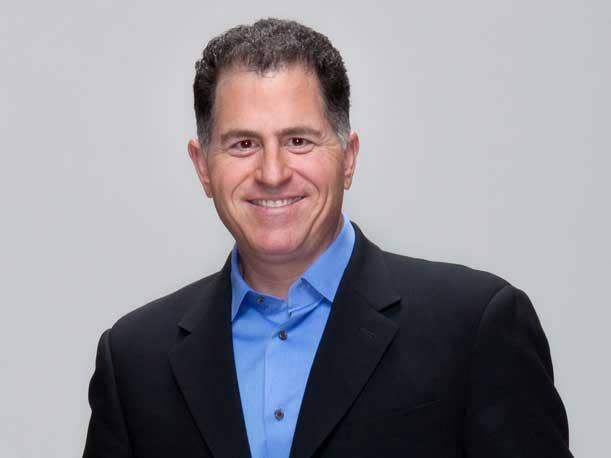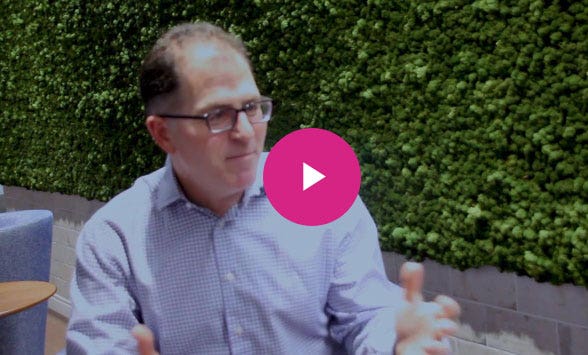Michael Dell: We're 'Growing A Lot Faster' Versus Cisco, HPE And IBM

Michael Dell told CRN that his vision of creating the "essential infrastructure company" by acquiring EMC and VMware has come to fruition with the company that bears his name now "larger and growing a lot faster" than rivals Cisco, IBM and Hewlett Packard Enterprise.
"It's been a fantastic year. Best year ever. The momentum in the business is quite strong," said Dell, founder, chairman and CEO of Dell Technologies, in an exclusive interview with CRN. "If you look at our data center business, we are the largest and we're bigger than Cisco. Bigger than IBM. Bigger than HPE. If you look at the growth in the first nine months through the end of October, our data center business grew plus-22 percent. So we’re the biggest and growing at 22 percent. Then you say, 'Well what did Cisco grow?' Cisco grew like 5 [percent] or 6 percent. HPE grew 4 percent, and IBM was negative. So we're larger and growing a lot faster."
Additional CRNtv Coverage: Michael Dell On 5G

http://crntv.crn.com/detail/videos/crntv/video/5980497962001
Michael Dell led his now-$87 billion Round Rock, Texas-based company to massive growth in 2018, becoming the leader in end-to-end technology infrastructure, which included surging ahead of HPE in both worldwide server and storage market share.
[Related: Michael Dell On Dell Going Public And Its 'Best Year Ever]
When Dell first unveiled its blockbuster acquisition of EMC in 2015 for a whopping $67 billion, not everyone believed Michael Dell could pull it off. "If you go back to October 2015, when we announced this little idea, people were like, 'What are you doing? How's that going to work?'" said Michael Dell.
After years of fine-tuning Dell, EMC and VMware technology integrations, architectures, channel programs and go-to-market strategies, Dell truly hit its stride in 2018. The company's Infrastructure Solutions Group— which includes servers, storage, networking and converged solutions—reported sales of $26.8 billion for the nine months ended Nov. 1, compared with $21.9 billion during the same period one year ago.
"It's not that hard to think through it. It's like, 'I have EMC storage. Should I have Dell servers? Well now it's Dell EMC storage and Dell EMC servers. So of course, let's do that.' We also now work with VMware," said Michael Dell. "So if you step back and think about it in hindsight, what we've done is we combined the leading storage company with the leading server company, which created the leading hardware infrastructure company, and we combined that with the leading software infrastructure company. So now you’ve got the essential infrastructure company. It all looks like a beautiful picture."
The Dell Technologies family includes Dell, Dell EMC, Pivotal, RSA, SecureWorks, Virtustream and VMware. Channel partners are reaping the benefits of Dell's vision of creating an end-to-end, one-stop shop infrastructure vendor for customers.
Scott Winslow, president of Winslow Technology Group, a Waltham, Mass.-based Dell Titanium Partner and CRN 2018 Triple Crown Award winner, said his company's Dell business was up more than 40 percent in 2018 year over year.
"Michael Dell made a big bet with the EMC acquisition, and it is paying off," said Winslow. "We are seeing growth across all of the areas where they compete: storage, server, networking, hyper-converged infrastructure, backup and end-user compute. As a result, we are hiring additional sales, engineering and operations personnel aggressively and expanding into new geographies. We are bullish on Dell in 2019 and beyond, particularly with Dell going public again. 'Go big or go home' as Michael Dell likes to say—and we are following suit."
Always with his sights on the future, Michael Dell is planning to elevate his company even further ahead of the competition by becoming a public company once again. After receiving shareholder approval on Dec. 11 to become public through a VMware stock swap deal, Dell Technologies is set to officially start trading on the New York Stock Exchange on Dec. 28 under the symbol DELL.
The benefits to becoming a public entity will be "significant," according to Tom Sweet, executive vice president and CFO of Dell Technologies.
In an interview with CRN, Sweet said becoming public will improve Dell's capital structure to drive better VMware integration, financial flexibility for future acquisitions and channel partner sales.
"We got the vote on Dec.11, but what that means for us is we've cleaned up the capital structure, the Class V stock falls away and we've aligned economic and ownership interest so that everyone participates when Dell Technologies wins collectively together," said Sweet, who is a 21-year Dell veteran. "It should drive more momentum in the business over time and it should provide us the ability to continue to build out solutions sets that are more integrated. It should provide the opportunity to partner better across our ecosystem. From a channel perspective, it should open up additional velocity as we think about how do we more effectively go to market and position integrated solutions."
Michael Dell said a key component to transitioning into a public company will be to not disrupt business for customers, the channel or Dell's internal staff. "For our partners, for our customers and for our team members, there's really no change. We're operating with the same approach we have been for the last five, six years," he said.
Partners are bullish about Dell Technologies’ future as a public company, expecting sales to skyrocket in 2019 and take even more market share from the competition. By enhancing technology integrations throughout the Dell Technologies family, Dell will become an even more unstoppable force in the market, said Michael Murphy, president of Nanuet, N.Y.-based Dell partner VirtuIT.
"Our Dell networking revenue doubled in 2018 over 2017. I suspect we are displacing Cisco business here," said Murphy, whose overall Dell EMC sales were up more than 20 percent year over year in 2018. "As long as there is tight integration between the Dell EMC and VMware sales teams so that partners can harness those synergies for customers, Dell EMC will continue to be unstoppable in 2019."
HPE for its part pointed to recent comments from CEO Antonio Neri, who said he is bullish on the 2019 outlook, with explosive growth in data continuing to drive strong sales of HPE intelligent edge, storage and compute products and HPE's hot-selling Greenlake consumption-based platform. "We have strong momentum across our differentiated portfolio as we head into an expected healthy IT spending environment in 2019," said Neri.
For its 2018 fiscal year ended Oct. 31, HPE, which exited the low-margin, tier-one custom hyper-scale server market in 2017, posted higher-than-expected sales growth of 7 percent to $30.9 billion. That full-year sales growth was led by 13 percent growth in the intelligent edge business; 13 percent growth in the storage business; 9 percent growth in value compute offerings, including 25 percent growth in high-performance compute and 280 percent growth for Synergy composable systems with a more than $1 billion annual run rate; and 54 percent growth for HPE's Greenlake pay-per-use infrastructure portfolio.
CRN also reached out to Cisco and IBM for comment but did not hear back by press time.
For its first fiscal quarter, which ended Oct. 27, Cisco reported revenue of $13.1 billion, up 8 percent year over year. The networking market leader's infrastructure platform business was up 9 percent; application business sales were up 18 percent; and security sales were up 11 percent.
IBM, which announced a blockbuster $34 billion deal to buy open-source kingpin Red Hat in October in a hybrid cloud game-changer, reported sales were down 2 percent in its third fiscal quarter ended Sept. 30. That said, IBM says over the last 12 months its strategic imperatives of cloud, mobile, analytics and social generated $39.5 billion in revenue, contributing roughly 50 percent of the company's total sales.
Michael Dell, for his part, said he couldn't be more excited about the future of the company he started in 1984 with just $1,000 in capital.
"We think the demand is going to continue to be very strong in 2019. The momentum we have in the channel is quite strong. It's a very different company than it was five or 10 years ago," he said. "We have a whole different set of capabilities with Dell EMC, VMware and Pivotal and the rest of the family. We're in a very good spot. The demand for technology infrastructure is going to remain very robust. We have a leading position that we don't take for granted. We have to work hard every day to earn the trust of partners and customers, but momentum is very good."